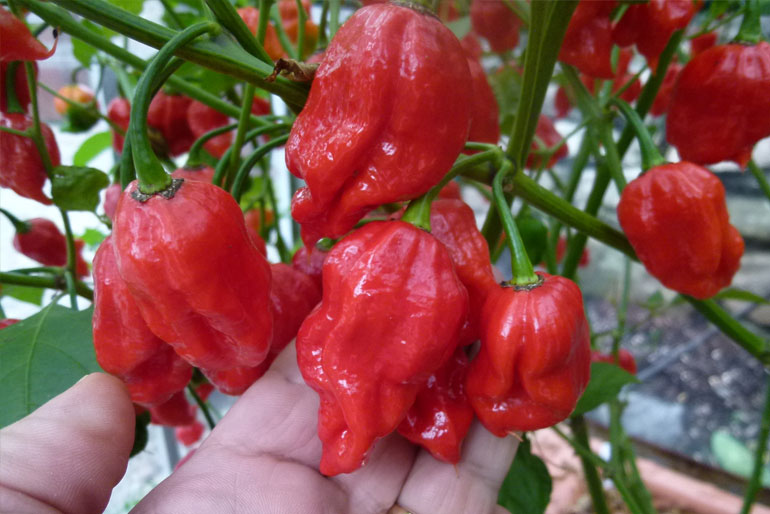
For spice lovers, the thrill of testing your taste buds with the world’s hottest peppers is an adventure. These peppers don’t just add a kick to your dishes—they redefine what it means to feel the heat. In 2025, the race for the hottest chili continues, with new champions and enduring legends. Below is a list of the top 10 hottest peppers in the world, based on their Scoville Heat Units (SHU), which measure the concentration of capsaicinoids, the compounds responsible for their fiery heat.

Pepper X reigns supreme as the hottest pepper in the world, packing an unparalleled heat level of 2,693,000 SHU. Developed by Ed Currie, the same cultivator behind the Carolina Reaper, Pepper X is not just about heat but also boasts a unique flavor profile that spice enthusiasts appreciate. This pepper’s potency makes it a true challenge for even the bravest chili lovers.

Once the undisputed champion, the Carolina Reaper now sits in second place but still delivers a mind-blowing heat. Its sweet and fruity undertones disguise the intense burn that follows. This pepper has been a favorite for hot sauce makers and chili lovers worldwide.

The Trinidad Moruga Scorpion brings both heat and flavor to the table. Originating from Trinidad and Tobago, this pepper’s intense spiciness builds slowly, leaving you with a lasting burn. It’s a staple for those who crave extreme heat with a slightly floral taste.

Known for its dark brown skin and fiery kick, the 7 Pot Douglah is a favorite among serious chili enthusiasts. Despite its searing heat, it’s prized for its earthy and nutty flavor, making it a unique addition to hot sauces and dishes.

With its distinctively gnarled appearance and extreme heat, the 7 Pot Primo is a pepper that commands respect. Developed in Louisiana, it’s said to be capable of spicing up seven pots of stew—hence the name.

Once a record holder for the world’s hottest pepper, the Trinidad Scorpion “Butch T” still holds its own among the spiciest. Its scorpion-like tail and ferocious heat make it unmistakable.

The Naga Viper is a hybrid pepper created in the United Kingdom. Combining the genetics of three other hot peppers, it delivers a complex heat that’s both sharp and enduring. Its rarity adds to its mystique.

The Ghost Pepper holds a special place in spicy history. Recognized as the hottest pepper in the world in 2007, it’s known for its smoky flavor and slow-building heat. Originating from India, it’s used in traditional dishes and modern spicy challenges.

The 7 Pot Barrackpore stands out for its intense heat and fruity undertones. It’s a favorite among gardeners and chili enthusiasts who appreciate its balance of flavor and spiciness.

Rounding out the list is the Red Savina Habanero. While it’s no longer the hottest pepper, it’s still incredibly spicy. Its bright red color and citrusy flavor make it a popular choice for hot sauces and salsas.
From the reigning champion Pepper X to the fiery Red Savina Habanero, the peppers on this list represent the pinnacle of heat. Whether you’re looking to challenge your spice tolerance or create a culinary masterpiece, these peppers offer something extraordinary. Remember, handling and consuming these peppers requires caution—a little goes a long way!
The Scoville scale measures the spiciness of peppers based on their capsaicin content, expressed in Scoville Heat Units (SHU).
Yes, consuming extremely hot peppers can cause severe discomfort, burning sensations, and in rare cases, health complications. Always approach with care.
Dairy products like milk or yogurt can help neutralize the burning sensation. Avoid drinking water, as it spreads the heat.
Yes, they are used in pepper sprays, natural pest repellents, and even for medical research into pain relief and metabolism boosters.
Many of these peppers can be grown at home with the right climate and care. They typically require warm temperatures and well-drained soil.